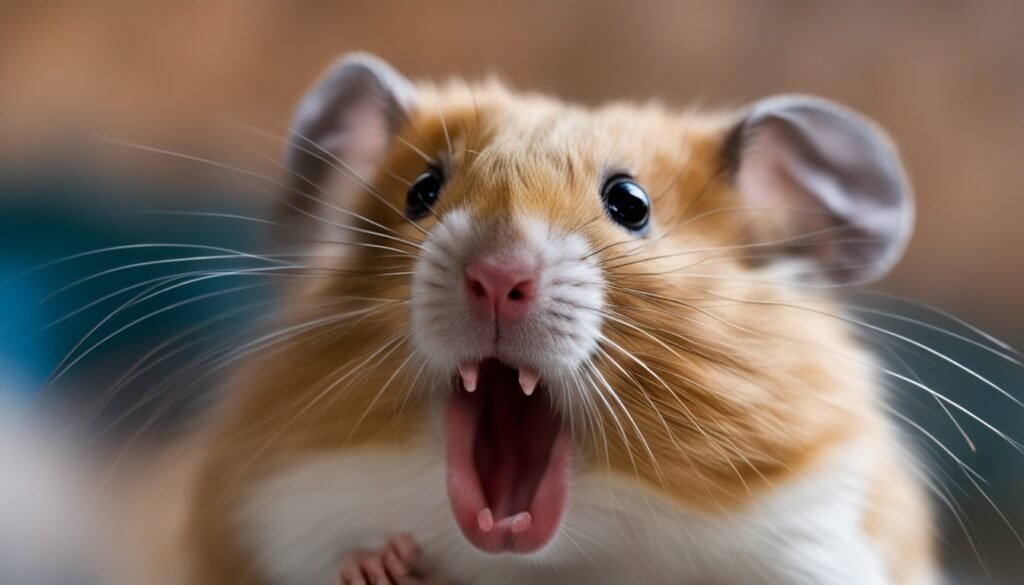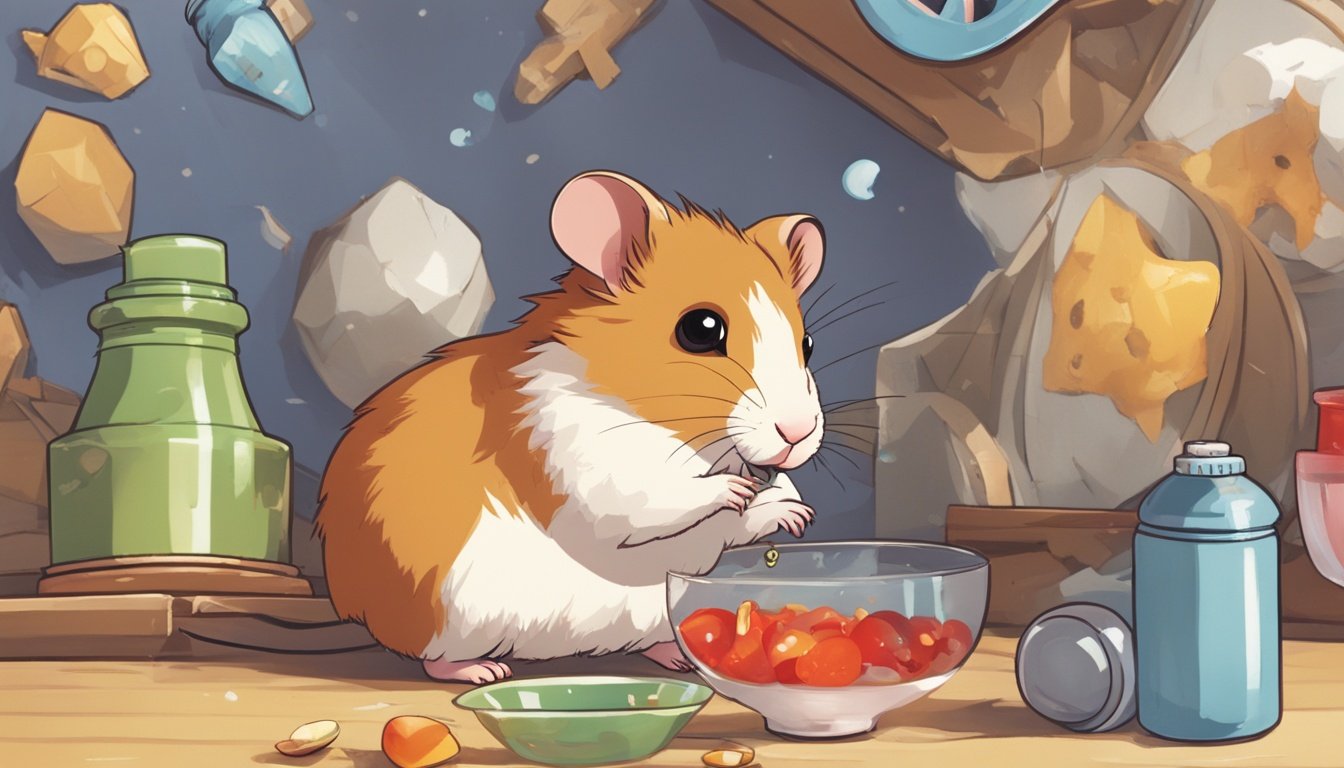Ever wondered why your hamster squeaks? It might mean they’re happy, scared, or something else. Although some people think hamsters are quiet, their squeaks tell us much. They help us know how the hamster feels and what it needs.
Hamsters use noises to talk to us. They show their feelings through these sounds. So it’s important to listen and understand your hamster’s squeaks. This way, you can make sure your pet is happy and healthy.
Key Takeaways
- Hamster squeaking can indicate happiness, fear, irritation, or hunger.
- Squeaking is more frequent among young hamsters compared to adults.
- Recognizing different hamster sounds is integral for understanding their needs and ensuring their well-being.
- Hissing typically signifies discomfort or feeling threatened.
- Clicking teeth, known as bruxing, signifies contentment and happiness.
- Crying or screaming indicates extreme alarm, fear, pain, or stress.
- Sneezing and coughing could be caused by environmental factors or common illnesses.
Understanding Hamster Squeaking Behavior
Hamsters squeak to tell us how they feel. They make different sounds depending on what is happening. For instance, user starog notes that hamsters, like Charlie, squeak more when they want attention. On the other hand, user LocoRocoPanda says their hamster Izu makes cheerful sounds when playing. This shows how hamster sounds change with their mood.
Listener user SnickersTheFirst mentions their hamsters make unique sounds. Pipsqueak and Snickers sound different when happy than when scared. This shows that each hamster has its own way of talking. LocoRocoPanda shares that their hamster makes noise wanting attention and squeals when upset. It proves that hamsters have a wide range of sounds to express their feelings and needs.

Dwarf hamsters prefer living with a friend but not every pair gets along. They may chase, sniff, and squeal when trying to be top-dog in their cage. This helps us understand how they interact with each other. But, if they have been apart, bringing them back together can lead to fighting because they want to protect their space.
Each hamster reacts in its way, depending on its past and its current situation. For example, user sammyandralph tells us that their hamster Bubbles was loud but got quieter once he settled in. This means a hamster’s squeak might change as they adjust. Also, female hamsters might squeak more when they are in heat.
By paying attention to our hamsters, we can learn a lot from their sounds. Understanding what these sounds mean can help us take better care of them. It strengthens the bond between us and our hamsters, making them happier.
Why Does My Hamster Squeak?
Hamsters squeak for many reasons. Each squeak shows how they feel and what they need. Being able to tell why they squeak is very helpful for taking care of them.
Happy Hamster
Happy hamsters may make soft, low sounds. They might do this when they’re with their owners or while eating treats. These little sounds mean your hamster is happy.
Scared Hamster
A scared hamster will squeak loudly and at a high pitch. It might be because they feel threatened or stressed. Knowing this helps you make your hamster feel safe.
Annoyed Hamster
If your hamster is annoyed, it might squeak. This can happen if it’s disturbed or if its things are taken away. Annoyed squeaks are sharp and loud. Changing your hamster’s surroundings can help it calm down.
Needs Attention or Something Else
Some hamsters squeak to ask for food, water, or attention. This is an important way they talk to us. They might even squeak just to be noticed. By listening to their squeaks, you can meet their needs better.
Hamster Communication Noises: What They Mean
Hamsters make various sounds, from squeaks to chirps, each with its own message. By understanding what these sounds mean, we can know how the hamster feels and what it needs. For example, a high-pitched chirp could show fear, especially in new places. It tells us the hamster feels unsure.
Chirping can mean different things too. When hamsters play fight, chirping can mean they’re having fun. But, if it turns into real fighting, it’s time to step in and separate them. In dwarf hamsters, chirping might show they’re unhappy with what’s happening around them.
Sometimes, the meaning of hamster sounds is serious. Chirping could signal sickness or being hurt, especially if it comes with other bad signs. Frantic squeaking might mean the hamster is in pain. This could be from an accident or being stuck.
But, not all squeaks are bad. Happy hamsters can make low-pitched sounds. Yet, high-pitched squeaks usually mean they’re scared or stressed. They may also squeak if they’re upset, like if they’re woken up or if their food and toys are taken away.
Hamsters also use sounds to tell us about their needs. Hunger, thirst, or wanting to come out of their cage are some examples. Sometimes, they make wheezing sounds if they have a cold. Male hamsters may make special sounds when they want to mate. Baby hamsters make high pitches sounds we might not hear.
It’s important to know what different hamster sounds mean. This helps us take care of them better. Understanding their sounds makes us better pet owners. It makes sure they’re happy and healthy in our care.
Recognizing Hamster Vocalizations
Understanding hamster sounds means knowing the type and when they make them. Each squeak gives clues about your hamster’s feelings. This helps you take better care of your little friend.
Types of Hamster Sounds
Hamsters use sounds like squeaks, chirps, and grunts to talk. They can even make sounds too high for us to hear. It’s key to listen to these sounds. For instance, happy squeaks are soft, while loud, high-pitched ones might show something’s wrong. To really know what your pet is saying, watch how it acts normally.
Contextual Clues
It’s not just the sound but also the situation that matters when a hamster makes noise. A new place or something changed might cause worried squeaks. Hams might also make loud sounds during fights to show they’re upset. Watching their actions and listening to the sound can keep them healthy and happy.
Hamster Squeaking and Other Behlaviors
When hamsters squeak, watch what else they’re doing. A scared hamster might squeak loudly and shake. This shows they’re not feeling safe. On the flip side, a happy hamster will make softer sounds, like chirping. They might yawn and stretch, signs they’re relaxed and content.
It’s key to look at both what your hamster is saying and doing. If a hamster is upset, it could squeak a lot if you bother it while sleeping. It may also move around a lot. These clues help you figure out what’s wrong, so you can keep them happy and calm.
Hamsters use sounds to tell us what they need or how they feel. They might squeak when they’re hungry or thirsty. They could also be asking to come out and play. And, if they’re in pain, their sounds might tell us they need the vet.
Hamsters that squeak a lot might need space from each other. Being social and showing care can often solve this issue. Making sure they always have food, water, and a clean home is important. This way, they stay happy and healthy under your care.
Health Concerns and Squeaking
Some hamster squeaks don’t just show feelings or needs. They might indicate the hamster is not well. It’s key to notice these signs early to keep your pet healthy. Listen closely to your hamster’s sounds, especially if they seem different.
Signs of Pain
A hamster’s squeak, along with odd actions, might mean it’s in pain. If it squeaks high and non-stop, and acts either too fast or too slow, it could be really uncomfortable or hurt. This is how hamsters let us know they are not feeling well. It’s really important you act fast and talk to a vet.
Respiratory Issues
When hamsters breathe with a squeak, it could mean they have breathing problems. Colds or the wrong bedding can make their breath sound wheezy. These issues can be serious and need a vet’s help. If your pet hamster keeps wheezing, or seems to struggle to breathe, get professional help right away for the best care.


Leave a Reply